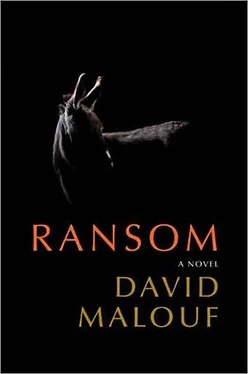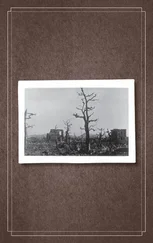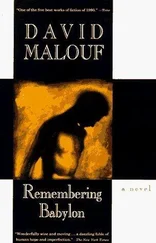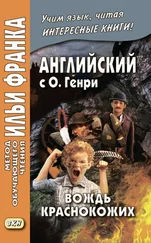The sea has many voices. The voice this man islistening for is the voice of his mother. He lifts his head, turns his face to the chill air that moves in across the gulf, and tastes its sharp salt on his lip. The sea surface bellies and glistens, a lustrous silver-blue — a membrane stretched to a fine transparency where once, for nine changes of the moon, he had hung curled in a dream of pre-existence and was rocked and comforted. He hunkers down now on the shelving pebbles at its edge, bunches his cloak between his thighs. Chin down, shoulders hunched, attentive.
The gulf can be wild at times, its voices so loud in a man’s head that it is like standing stilled in the midst of battle. But today in the dawn light it is pondlike. Small waves slither to his sandalled feet, then sluice away with a rattling sound as the smooth stones loosen and go rolling.
The man is a fighter, but when he is not fighting he is a farmer, earth is his element. One day, he knows, he will go back to it. All the grains that were miraculously called together at his birth to make just these hands, these feet, this corded forearm, will separate and go their own ways again. He is a child of earth. But for the whole of his life he has been drawn, in his other nature, to his mother’s element. To what, in all its many forms, as ocean, pool, stream, is shifting and insubstantial. To what accepts, in a moment of stillness, the reflection of a face, a tree in leaf, but holds nothing, and itself cannot be held.
As a child he had his own names for the sea. He would repeat them over and over under his breath as a way of calling to her till the syllables shone and became her presence. In the brimming moonlight of his sleeping chamber, at midday in his father’s garden, among oakwoods when summer gales bullied and the full swing of afternoon came crashing, he felt himself caught up and tenderly enfolded as her low voice whispered on his skin. Do you hear me, Achilles? It is me, I am still with you. For a time I can be with you when you call.
He was five then, six. She was his secret. He floated in the long soft swirlings of her hair.
But she had warned him from the beginning that she would not always be with him. She had given him up. That was the hard condition of his being and of all commerce between them. One day when he put his foot down on the earth he knew at once that something was different. A gift he had taken as natural to him, the play of a dual self that had allowed him, in a moment, to slip out of his hard boyish nature and become eel-like, fluid, weightless, without substance in his mother’s arms, had been withdrawn. From now on she would be no more than a faint far-off echo to his senses, an underwater humming.
He had grieved. But silently, never permitting himself to betray to others what he felt.
Somewhere in the depths of sleep his spirit had made a crossing and not come back, or it had been snatched up and transformed. When he bent and chose a stone for his slingshot it had a new weight in his hand, and the sling had a different tension. He was his father’s son and mortal. He had entered the rough world of men, where a man’s acts follow him wherever he goes in the form of story. A world of pain, loss, dependency, bursts of violence and elation; of fatality and fatal contradictions, breathless leaps into the unknown; at last of death — a hero’s death out there in full sunlight under the gaze of gods and men, for which the hardened self, the hardened body, had daily to be exercised and prepared.
A breeze touches his brow. Far out where the gulf deepens, small waves kick up, gather, then collapse, and new ones replace them; and this, even as he watches, repeats itself, and will do endlessly whether he is here or not to observe it: that is what he sees. In the long vista of time he might already be gone. It is time, not space, he is staring into. For nine years winter and summer they have been cooped up here on the beach, all the vast horde of them, Greeks of every clan and kingdom, from Argos and Sparta and Boeotia, from Euboea, Crete, Ithaca, Cos and the other islands, or like himself and his men, his Myrmidons, from Phthia. Days, years, season after season; an endless interim of keeping your weapons in good trim and your keener self taut as a bowstring through long stretches of idleness, of restless, patient waiting, and shameful quarrels and unmanly bragging and talk.
Such a life is death to the warrior spirit. Which if it is to endure at the high point needs action — the clash of arms that settles a quarrel quickly, then sends a man back, refreshed in spirit, to being a good farmer again.
War should be practised swiftly, decisively. Thirty days at most, in the weeks between new spring growth and harvest, when the corn is tinder-dry and ripe for the invader’s brand, then back to the cattle pace of the farmer’s life. To calendar days and what comes with them; to seedtime and ploughing and the garnering of grain. To tramping in your old sandals across sunstruck fields, all dry sticks and the smell of wild mint underfoot. To sitting about in the shade doling out the small change of gossip, and listening, while flies buzz and the sweat streams from your armpits, to interminable disputes — the administering of justice on home ground. To pruning olives, and watching, over months, the swelling of a broodmare’s belly or the sprouting of the first pale blade among sods. To noting how far a son has grown since last year’s notch on a doorjamb.
In these nine years his own son, Neoptolemus, away there in his grandfather’s house, has been growing up without him. Days, weeks, season after season.
The sun is climbing now. He pushes to his feet. Stands for a last moment filled with his thoughts; his mind, even in its passive state, the most active part of him. Then, head down, his cloak drawn close about him, starts back along the sloping beach towards the camp.
There is a singing in the air, so high-pitched that it might be spirits. It comes from the rigging of the ships that swing at anchor, recent arrivals, or are drawn up in pinewood cradles along the strand.
There are more than a thousand of them. Their spars, in silhouette against the pallid sky, are like a forest magically transported. After so many months ashore, their hulls are white as bone. They stretch in a line back to the camp, and on the sea side make one of its walls.
He moves quickly now, it is cold out of the sun. Walking awkwardly against the slope of the beach, he has a drunken gait. His sandals slip on the pebbles, some of which are as large and smooth as duck eggs. Between them, brown-gold bladder-wrack still damp from the tide.
When the last of the line of ships is behind him, he pauses and takes a long look out across the gulf. The sea, all fire, spreads flat to the horizon. So solid-looking and without depth, so enticing as a place to move to, that a man might be tempted to make a sharp turn right and try walking on it, and only when it opened and took him down discover he had been tricked by a freak of nature.
But the sea is not where it will end. It will end here on the beach in the treacherous shingle, or out there on the plain. That is fixed, inevitable. With the pious resignation of the old man he will never become, he has accepted this.
But in some other part of himself, the young man he is resists, and it is the buried rage of that resistance that drives him out each morning to tramp the shore. Not quite alone. With his ghosts.
Patroclus, his soulmate and companion since childhood.
Hector, implacable enemy.
Patroclus had simply appeared one afternoon in his father’s court, a boy three years older than himself and nearly a head taller. Thin-jawed, intense, with the hands and feet, already disproportionately large, of the man he was growing into.
Читать дальше












